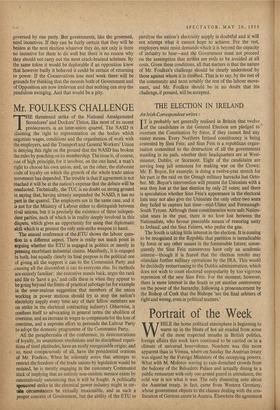THE ELECTION IN IRELAND
An Irish Correspondent writes : IT is probably not generally realised in Britain that twelve d the candidates in the General Election are pledged to overturn the Constitution by force, if they cannot find any easier means. Every Northern Ireland constituency is being contested by Sinn Fein; and Sinn Fein is a republican organ- isation committed to the destruction of all the governments standing in its path, whether their headquarters are at West- minster, Dublin, or Stormont. Eight of the candidates are serving long jail sentences for making war on the Crown; Mr. E. Boyce, for example, is doing a twelve-year stretch for his part in the raid on the Omagh military barracks last Octo- ber. Mr. Boyce's intervention will present the Unionists with a seat they lost at the last election by only 25 votes; and there is speculation whether Sinn Fein's appearance in the electoral lists may not also give the Unionists the only other two seats they failed to capture last time—mid-Ulster and Fermanagh- South Tyrone. Although these constituencies were safe Nation- alist seats in the past. there is no love lost between the Nationalists, who favour peaceable means of restoring unity to Ireland, and the Sinn Feinets, who prefer the gun.
The South is taking little interest in the election. It is coming to be recognised in the Republic that partition is ineradicable by force or any other means in the foreseeable future; conse- quently the. Sinn Fein manoeuvres have only an academic interest—though it is feared that the election results may stimulate further military operations by the IRA. This would be decidedly embarrassing to the Dublin administration, which does not wish to court electoral unpopularity by too vigorous repression of the new Sinn Fein. For the moment, however, there is more interest in the South in yet another controversy on the power of the hierarchy, following a pronouncement by the Bishop of Cork that the Bishops 'are the final arbiters of right and wrong, even in political matters.'










































 Previous page
Previous page